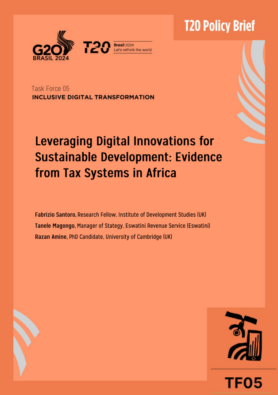T20 Task Force 05
Recent evidence, based on original research from the Institute of Development Studies, explores the intersection of tax systems and digital innovations in Africa, focusing on experiences from Rwanda, Uganda, Eswatini, Kenya, and beyond. A number of lessons can be derived from specific technological applications, such as online filing and payment of taxes, electronic fiscal devices, online registration, and digital payments for business transactions. Such lessons are essential to understand the potential of technology to advance the Sustainable Development Goals (SDGs). The research produces key findings that reveal distinct challenges and opportunities in the adoption of digital tax services and electronic payments. For instance, even when mandating the usage of digital tools in tax
systems, as in Rwanda and Eswatini, adoption is not universal, since digital divides persist between users and non-users. Technology that streamlined bureaucratic procedures, such as tax registration in Uganda, seems effective in boosting registration numbers and easing the process for taxpayers. At the same time, manual habits and strong preference for cash are difficult to shape, limiting adoption patterns of digital payments in the economy across multiple African countries. This evidence offers essential insights to shape policies that advance SDGs through the strategic integration of tax and technology. Namely, we recommend governments to focus more on the barriers that often impede accessibility to translate into adoption, to tackle persisting hurdles that make taxpayers’ life cumbersome after going to digital, and to identify the multiple issues arising from a digital shift in administrative processes, so to design digitalisation policies more coherent with the context in which they happen.

